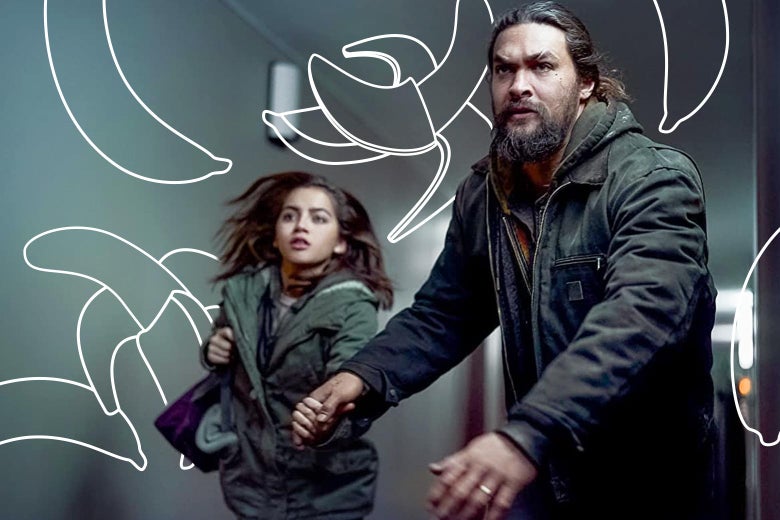
Upon first glance, the new movie Sweet Girl does not really seem like the kind of movie that would have a mind-blowing twist. It stars Jason Momoa as Ray Cooper and Isabela Merced as his daughter Rachel, both of whom are left devastated after Amanda (Adria Arjona), Ray’s wife and Rachel’s mother, dies of cancer. A new drug that could have saved her life was pulled off the market after a larger company, BioPrime, pays them off in order to keep a monopoly on treatment. Ray blames BioPrime’s CEO, Simon Keeley (Justin Bartha), and thus a quest for justice begins.
“This seems like pretty boilerplate thriller stuff,” you might be inclined to say. “You’re telling me there’s a twist here?” The thing is, yes, there is a twist, and it is, as we like to say at Slate, bananacakes. Luckily, I’ve watched the whole thing, which currently ranks No. 1 on Netflix’s Top 10, so I can answer all of your questions.
This seems like pretty boilerplate thriller stuff. You’re telling me there’s a twist here?
Yes. Rachel is Ray.
Rachael Ray?
No.
Rachel is Ray?
Yes.
What does that mean?
Let me backtrack a little first. So, at the beginning of the movie, we see Ray getting chased across the roof of a baseball stadium. Then, we flash back to see the circumstances under which Amanda died (i.e. waiting for an affordable treatment that gets pulled from the market because of BioPrime). Six months later, Ray meets up with a reporter who is trying to expose what BioPrime is doing. Unfortunately, the reporter is stabbed by a hitman, who then gets into a tussle with Ray and Rachel, stabbing Ray and knocking Rachel out.
Two years after that, Ray and Rachel are shown to still be on BioPrime’s tail, as Ray beats up all sorts of baddies while in pursuit of Keeley, the man responsible for it all. There are, of course, a lot of obstacles, including the hitman, who is still alive, but the important part is that Rachel, unbeknownst to her dad, keeps sneaking out to call a friendly FBI agent, who tries to help her. When we finally catch up to the scene that starts the movie, the FBI agent brings up a key detail—a doll named Paloma that was important to Rachel—and reveals that Rachel has just been imagining that her father is still alive, and it’s actually her who has been beating up all those people on her own since his death by stabbing two years ago.
Wait, why?
They do not really explain this, but the long and short version of the story is that this is how Rachel has been processing her trauma.
I’m pretty sure that’s not in the DSM-5.
Yeah, I don’t think so.
How does it work?
Well, Rachel basically does everything she imagines Ray doing—i.e., beating people up with all of the strength of the towering actor who played both Khal Drogo and Aquaman—and always imagines herself as either not present or somehow separated from the action.
And no one around her is confused or shocked about this?
Not to the extent that you’d really pick up on it.
Are there any clues leading up to the reveal that give any indication that this is what’s happening?
Only if you’re already looking for them, which I imagine most viewers won’t be. For instance, one of Ray’s early monologues involves him musing on the fact that it’s hard to tell where parents stop and children begin. (Get it?) Later, when Ray-Rachel catches up to Keeley, he seems confused, but doesn’t say anything like, “Wait, why is a little girl attacking me?”
So what happens after that?
Rachel kills the hitman who’s been after her, and then she manages to record a confession from the congresswoman who’d sent him after her family, both for ordering the hit and for taking a bribe from BioPrime. Then Rachel gives a monologue similar to Ray’s at the beginning, wondering where her parents end and she begins.
There’s no bigger revelation about why or how Rachel has convinced herself she’s been Ray this whole time?
No.
Is there more to this movie than the twist? Like, is it good?
Jason Momoa is pretty good in the early parts of the film where he’s allowed to be emotionally vulnerable, but the rest of the movie does not have too much else to offer beyond, y’know, the twist, which you now know.
Isn’t it a little ironic that you’re making fun of this movie for staging all of these conversations that take place only in the main character’s imagination, but meanwhile this whole conversation takes place only in your own mind?
Yes, but we already made that joke!
You need to get some new ideas.
So does Hollywood!
"sweet" - Google News
August 24, 2021 at 05:13AM
https://ift.tt/3zghe1x
The Bananas Twist in Jason Momoa’s No. 1 Netflix Hit, Explained - Slate
"sweet" - Google News
https://ift.tt/2PcPlld
https://ift.tt/2KSpWvj
Bagikan Berita Ini














0 Response to "The Bananas Twist in Jason Momoa’s No. 1 Netflix Hit, Explained - Slate"
Post a Comment